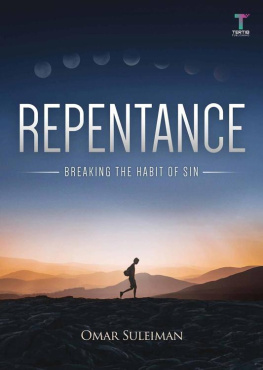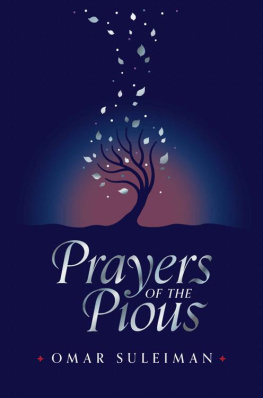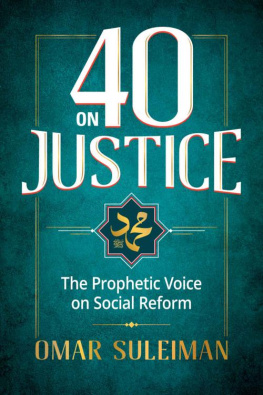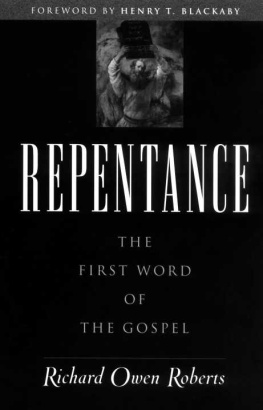Omar Suleiman - Repentance
Here you can read online Omar Suleiman - Repentance full text of the book (entire story) in english for free. Download pdf and epub, get meaning, cover and reviews about this ebook. year: 2020, publisher: Tertib Publishing, genre: Romance novel. Description of the work, (preface) as well as reviews are available. Best literature library LitArk.com created for fans of good reading and offers a wide selection of genres:
Romance novel
Science fiction
Adventure
Detective
Science
History
Home and family
Prose
Art
Politics
Computer
Non-fiction
Religion
Business
Children
Humor
Choose a favorite category and find really read worthwhile books. Enjoy immersion in the world of imagination, feel the emotions of the characters or learn something new for yourself, make an fascinating discovery.
- Book:Repentance
- Author:
- Publisher:Tertib Publishing
- Genre:
- Year:2020
- Rating:3 / 5
- Favourites:Add to favourites
- Your mark:
- 60
- 1
- 2
- 3
- 4
- 5
Repentance: summary, description and annotation
We offer to read an annotation, description, summary or preface (depends on what the author of the book "Repentance" wrote himself). If you haven't found the necessary information about the book — write in the comments, we will try to find it.
Repentance — read online for free the complete book (whole text) full work
Below is the text of the book, divided by pages. System saving the place of the last page read, allows you to conveniently read the book "Repentance" online for free, without having to search again every time where you left off. Put a bookmark, and you can go to the page where you finished reading at any time.
Font size:
Interval:
Bookmark:
REPENTANCE:
BREAKING
THE HABIT OF
SIN
REPENTANCE: BREAKING THE HABIT OF SIN
First published in Malaysia by
Tertib Publishing
23-2 Jalan PJS 5/30
Petaling Jaya Commercial City (PJCC)
46150 Petaling Jaya, Selangor
Malaysia
Tel: +603 7772 3156
First Edition: January 2020
Omar Suleiman 2020
All Rights Reserved.
Cataloguing in-Publication Data is available from the National Library of Malaysia
ISBN: 978-967-17402-9-3
eISBN: 978-967-2420-38-5
Cover design: Zahin Zulkipli | www.zahinzul.com
Typesetting & Layout: Ainul Syuhada
Printed by: Firdaus Press Sdn. Bhd.
T he soul rises to its best form when it connects to Allah (glorified and exalted is He) the most. The Prophet (peace be upon him) was asked in hadith Jibril, Tell me about excellence (ihsaan). He said, That you worship Allah as if you can see Him and if you cannot see Him, then you know that He sees you.
What that means is you are no longer operating with the set of expectations that have been created by the people around you. The way that you purify your soul the most is by connecting it to Allah (glorified and exalted is He) as its Greatest Observer. Because then your standard of success and excellence are the standards that Allah has set for you. Therefore, you are constantly in pursuit of that excellence and of being pleasing to the sight of Allah (glorified and exalted is He). In the process, you shed the things that would keep you disconnected from Him.
Imam Al-Ghazali (may Allah have mercy on him) said that the difference between taqwa and ihsaan is as the following:
Taqwa is to be conscious of the sight of Allah upon you, so that you are ashamed to disobey Allah (glorified and exalted is He) in private or in public with minor or major sins. Umar ibn Al-Khattab (may Allah be pleased with him) said that taqwa is like walking between thorny bushes and making sure that you do not get pricked by any of the thorns that are on those bushes.
There is a difference between the fear of Allah and consciousness of Allah (glorified and exalted is He). Taqwa is a combination of both. Because you are aware of Allahs sight upon you, therefore you fear to dishonor yourself in His sight. There is a certain awe that overtakes you.
Ihsaan is when you are not only aware of the sight of Allah upon you, but you honor the sight of Allah upon you by beautifying yourself in private with good deeds that are only between you and Allah (glorified and exalted is He). In other words, ihsaan is rising to the next level where you are not simply aware of Allahs sight upon you in a way that would cause you to dismiss evil, but rather you are honoring the sight of Allah upon you by acting with good deeds for the sake of that sight.
One thing to remember: You cannot get to ihsaan without taqwa.
W hen it comes to the purification of the soul, the goal of tazkiya is to get to a place of ihsaan. What does it mean by a place of ihsaan? It is a state of the soul mentioned in the Quran: an-nafs al-mutmainnah or the soul that is at peace. However, before we can get there, we need to have at least an-nafs al-lawwamah or a soul that accounts and admonishes itself. It is ditching the sins that serve as a barrier between you and Allah (glorified and exalted is He).
Umar bin Abdul Aziz (may Allah have mercy on him) said, Taqwa is not praying tahajjud in the night, nor giving extra charity in the day. Rather, it is abandoning that which is displeasing to Allah (glorified and exalted is He). Anything that exceeds that is ihsaan (excellence). He is actually the one who really explains the way that these two concepts taqwa and ihsaan operate hand in hand.
What does this have to do with repentance? Our goal is not just to reach a place in which we will not be punished by Allah that is an example of having a bad assumption of Allah (glorified and exalted is He). Rather, our goal is to get to a place where Allah is actually pleased with us, where we long for our meeting with Allah (glorified and exalted is He), and where we expect the best reward from Him. Therefore, even while we are struggling to attain taqwa, our ultimate goal remains ihsaan.
I n the book Mukhtasar Minhaj Al-Qasidin, it is mentioned that the greatest punishment of sin is that it serves as a barrier between you and Allah (glorified and exalted is He). In the same way, the greatest reward is not Jannah, but the pleasure of Allah. The pleasure of Allah (glorified and exalted is He) manifests itself in Jannah while His anger manifests itself in Hellfire. Is there any basis for this in the sunnah of the Prophet (peace be upon him)? Yes.
The Prophet (peace be upon him) was asked this verse in the Quran:
For them who have done good is the best (reward) and extra ...
(Surah Yunus, verse 26)
In a narration by Ibn Hibban, the companions asked the Prophet (peace be upon him), O Rasulullah, we know what excellence (husna) is, but what is more than that? The Prophet (peace be upon him) replied, To see the face of Allah (glorified and exalted is He).
The actually meet Allah (glorified and exalted is He) while He is pleased with you is what is meant by more than that. That is why the highest level of Paradise are the people that see Allah most. Some people see Allah (glorified and exalted is He) once a week in Jannah, some people see Him once a day, some people see Him twice a day, and some people in the highest level of Jannatul Firdaws can see Allah (glorified and exalted is He) as much as they want to.
The Prophet (peace be upon him) said that the highest reward is not the material reward, but it is the pleasure of Allah (glorified and exalted is He) of which the material reward in Jannah is one manifestation of it. As for the greatest punishment, Allah (glorified and exalted is He) mentions the people of Hellfire,
... and Allah will not speak to them on the Day of Resurrection, nor will He purify them; and they will have a painful punishment.
(Surah Ali Imran, verse 77)
There is another verse where Allah (glorified and exalted is He) mentions,
And those in the Fire will say to the keepers of Hell, Supplicate your Lord to lighten for us a day from the punishment.
(Surah Ghafir, verse 49)
Imam Ibn Uthaymeen (may Allah have mercy on him) said something powerful about this verse. He said, Look at this verse. Number one, they say to the angels Call upon your Lord because that means they cannot call upon Allah anymore. That is the first level of despair. Who stops you in this world from saying, Ya Allah? Now the people of Hellfire no longer have that connection.
Number two or the second level of despair is that they attribute the Lord to the angels rather than themselves, which shows the disconnect. They say Call upon your Lord, not our Lord. Which means they are so disconnected they do not see Allah as their Lord.
The third level of despair is they lost such hope in Allah that they do not even ask Him to end the punishment. Instead, they just ask Him to lighten the punishment for one day. This shows the disconnection that they have with Allah (glorified and exalted is He) at that point. That is worse than the fire itself.
Font size:
Interval:
Bookmark:
Similar books «Repentance»
Look at similar books to Repentance. We have selected literature similar in name and meaning in the hope of providing readers with more options to find new, interesting, not yet read works.
Discussion, reviews of the book Repentance and just readers' own opinions. Leave your comments, write what you think about the work, its meaning or the main characters. Specify what exactly you liked and what you didn't like, and why you think so.












